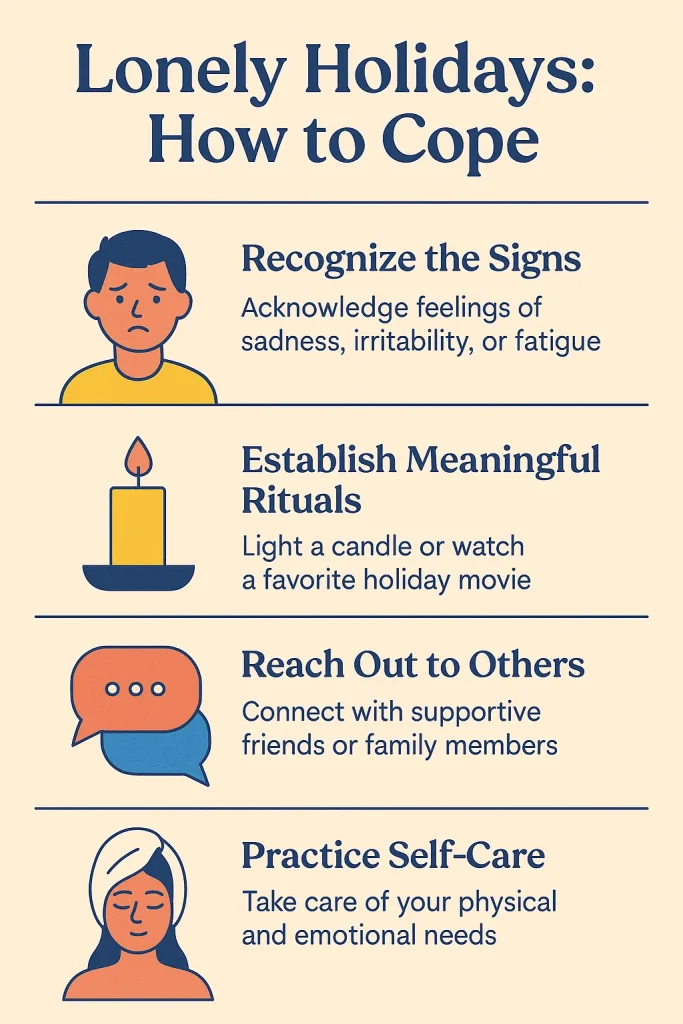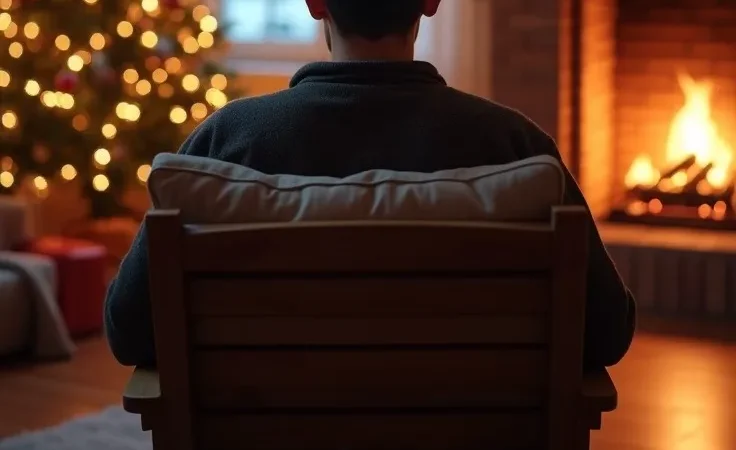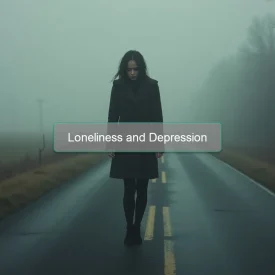Holidays are often painted as joyful times filled with laughter, family gatherings, and warm traditions. But for many people, this season can feel lonely instead of festive. If you find yourself dreading the holidays because of isolation, grief, or unmet expectations, you’re not alone.
However, holiday loneliness doesn’t have to define your experience. With the right mindset and coping strategies, you can find comfort, meaning, and even joy during this season.
Let’s explore why holiday loneliness happens and practical ways to handle it.
On a personal note, I remember one year after moving to a new city, the holidays felt strangely quiet. I was surrounded by festive lights and cheerful ads, yet I missed the comfort of familiar voices and traditions back home. That experience taught me just how powerful—yet common—holiday loneliness can be.

Key Takeaways
- Holiday loneliness is common and can be triggered by distance, grief, financial stress, or social comparisons.
- Recognizing the signs—emotional, behavioral, and physical—helps you address loneliness before it worsens.
- Coping strategies like gratitude, small traditions, volunteering, and technology can bring comfort and connection.
- Spending the holidays alone doesn’t have to feel empty—self-care, journaling, or a change of scenery can make it meaningful.
- Support is available through therapy, support groups, or hotlines if loneliness begins to impact daily life.
Understanding Lonely Holidays

Understanding why loneliness arises during the holidays is the first step toward coping more compassionately with your feelings.
Why Holidays Can Trigger Feelings of Loneliness
Holidays bring extra focus on family, relationships, and togetherness. This spotlight can make disconnection feel sharper if you’re far from loved ones, dealing with loss, or struggling with unmet expectations.
Even small triggers—like seeing others’ celebrations on social media—can make loneliness feel more intense.
The Difference Between Solitude and Loneliness
Solitude is a chosen, peaceful time alone. It can be restorative and enjoyable.
Loneliness, on the other hand, is the painful sense of being disconnected, even if you’re surrounded by people.
Recognizing the difference helps you approach the holidays with healthier expectations and tools.
Explore more about loneliness vs solitude to better understand how chosen alone time differs from painful isolation.
Common Causes of Holiday Loneliness

Holidays can be a joyful time, but several factors often contribute to feelings of loneliness and isolation during this season.
For more about understanding and coping with feeling lonely, see our detailed guide.
Distance From Family or Friends
Living far away or being unable to travel during the holidays can leave you feeling cut off from meaningful traditions and people you love.
Grief and Loss During the Holidays
If you’ve lost a loved one, holidays can reopen wounds. The absence of familiar faces at the table makes the season feel empty.
Social Media Comparisons and Expectations
Scrolling through picture-perfect holiday photos can create unrealistic standards. It’s easy to compare your quiet day to others’ highlight reels, fueling feelings of inadequacy.
Financial Stress and Gift Pressure
Holidays often come with spending expectations. If you’re struggling financially, this pressure can heighten stress and isolation.
Emotional and Physical Signs You’re Experiencing Holiday Loneliness
Recognizing the different ways holiday loneliness can manifest is important to addressing it effectively.

Emotional Signs:
You may feel unusually down, snappy, or stuck in negative thoughts about yourself or the season.
- Sadness that lingers throughout the day
- Increased irritability or mood swings
- Feelings of hopelessness or helplessness
- Heightened anxiety or restlessness
Behavioral Signs:
You might avoid group activities, skip traditions, or retreat into habits that keep you disconnected.
- Withdrawing from social gatherings or family events
- Avoiding holiday-related activities or traditions
- Increased use of alcohol, drugs, or comfort foods as coping mechanisms
- Neglecting personal care or daily responsibilities
Physical Signs:
Loneliness can affect the body too, showing up as low energy, trouble sleeping, or changes in eating patterns.
- Experiencing fatigue or low energy
- Noticing changes in sleep or appetite
- Physical aches or headaches without a clear cause
- Gastrointestinal issues such as nausea or indigestion
The Impact of Lonely Holidays on Mental Health
Holiday loneliness isn’t just a fleeting feeling—it can significantly affect your mental health in both the short and long term, especially during a season that emphasizes togetherness.
Short-Term Emotional Toll
During the holidays, feelings of loneliness can intensify emotions such as sadness, frustration, and self-doubt.
These immediate emotional struggles may lead to a sense of being overwhelmed or disconnected, making it difficult to enjoy traditional celebrations or engage with loved ones.
Long-Term Risks
When holiday loneliness is left unaddressed year after year, it can contribute to more serious mental health issues like depression, anxiety, and chronic stress.
This persistent emotional pain may interfere with daily functioning beyond the holiday season, affecting overall well-being.
The Connection Between Holiday Loneliness and Seasonal Affective Disorder
The winter months bring shorter daylight hours and reduced sunlight exposure, which can trigger Seasonal Affective Disorder (SAD).
SAD is a type of depression closely linked to holiday loneliness, as both share symptoms such as low mood, fatigue, and social withdrawal. Recognizing this connection is important for seeking appropriate support during lonely holidays.
Coping Strategies for Lonely Holidays

While feeling lonely during the holidays can be challenging, there are effective strategies to help you find comfort, connection, and meaning during this time.
Reframing Your Expectations
Letting go of the “perfect holiday” ideal allows you to create realistic and compassionate expectations for yourself.
Accepting your current situation can reduce pressure and help you focus on what truly matters.
Building Small, Meaningful Traditions
You don’t need a large gathering to celebrate. Engaging in simple rituals—like lighting a candle, journaling, or watching a favorite holiday movie—can provide a sense of comfort and continuity.
Volunteering and Giving Back
Participating in local food drives, shelters, or community events allows you to connect with others and experience a meaningful sense of purpose, which can counter feelings of loneliness.
Practicing Gratitude and Mindfulness
Focusing on what you have, rather than what’s missing, helps shift your mindset.
Even a brief daily gratitude practice or mindfulness exercise can improve emotional well-being during lonely holidays.
Using Technology to Stay Connected
Video calls, group chats, or online holiday events can help bridge the gap created by physical distance, enabling you to maintain emotional closeness with family and friends.
AI Companions for Emotional Support
Technology can ease holiday loneliness when loved ones aren’t nearby. AI companions like an AI girlfriend can be an optional support tool—offering conversation and comfort when reaching out feels hard. They’re not a replacement for real relationships, but they can help you feel less alone. Curious? See our guide on What is an AI Girlfriend.
Creative Ways to Spend the Holidays Alone

If you find yourself spending the holidays solo, here are some thoughtful suggestions to help you feel more connected and fulfilled during this time.
- Self-Care Rituals and Pampering
Treat yourself with a spa day at home, cozy pajamas, or a new book.
- Cooking or Baking Something Special for Yourself
Create a meal just for you. Cooking can be a soothing, creative act of self-love.
- Journaling or Reflective Practices
Use the quiet to write, reflect, or set intentions for the coming year.
- Taking a Holiday Trip or Staycation
A change of scenery—whether traveling or booking a hotel locally—can make the holidays feel fresh and exciting.
Supporting Others Who Feel Lonely During the Holidays

Sometimes, a small gesture or understanding can make a big difference in helping someone navigate feelings of loneliness during the holidays.
How to Recognize When Someone You Know Feels Lonely
Look for signs like withdrawal, avoiding gatherings, or subtle comments about being left out.
- Simple Acts of Reaching Out
A call, text, or small invitation can mean more than you realize. Even a short message shows someone they matter.
- Encouraging Professional Help if Needed
If a loved one seems deeply affected, gently suggest counseling or share resources. Sometimes, even offering to help them look up a therapist or sending them the number of a local support line can show that you care. You might also invite a neighbor or coworker for a simple coffee or walk—small actions can make a big difference when someone is feeling isolated.
When to Seek Professional Help
Knowing when to reach out for professional support is an important step toward healing and managing holiday loneliness effectively.
Signs Your Holiday Loneliness Needs More Than Self-Care
If loneliness starts to impact your daily functioning, sleep, or overall well-being, it’s a sign to seek more support.
Therapy, Support Groups, and Hotlines
If feelings of loneliness begin to significantly impact your daily functioning, disrupt your sleep, or affect your overall well-being, it may be time to seek additional support. Persistent sadness, difficulty concentrating, or withdrawal from everyday activities are important signals that professional help could be beneficial.
Therapy provides a safe and confidential space to explore your feelings, develop coping skills, and work through emotional challenges related to holiday loneliness and beyond.
Support groups offer connection and understanding by bringing together people who share similar experiences, normalizing feelings of isolation.
Hotlines are available to provide immediate assistance when feelings become overwhelming, offering crisis intervention and guidance whenever you need it most.
To better assess your experience, you can take a loneliness test designed to help you reflect.
Moving Beyond Lonely Holidays
Building resilience against loneliness means developing habits and connections that support your well-being throughout the entire year, not just during the holidays.
Building Stronger Connections Year-Round
Don’t wait until the holidays to nurture relationships. Regular check-ins and meetups help create lasting bonds.
Learning to Embrace Healthy Solitude
Time alone doesn’t have to equal loneliness. Explore hobbies, personal growth, or simply rest.
Creating a Sustainable Support System
Cultivate a network of friends, mentors, or communities you can lean on year-round.
Final Thoughts on Coping With Lonely Holidays
Lonely holidays are more common than many people admit. If this season feels heavy for you, remember you’re not alone in that experience. By reshaping your expectations, building new traditions, and reaching out for support, you can turn the holidays into a time of healing and meaning.
Even if your celebrations look different from the “perfect picture,” they can still be deeply fulfilling in their own way.
Frequently Asked Questions
Why do the holidays feel so lonely?
Holidays highlight togetherness, so if you’re apart from loved ones or grieving, loneliness can feel stronger. Social media can also make you compare and feel left out.
How can I tell if my holiday loneliness is serious?
If loneliness affects your daily life, sleep, or mood beyond the holidays, it may need extra support.
What are healthy ways to cope with holiday loneliness?
Try setting realistic expectations, creating new traditions, volunteering, and staying connected through calls or technology.
Can holiday loneliness impact my health?
Yes, it can cause sadness, anxiety, fatigue, and sleep problems if not addressed.





